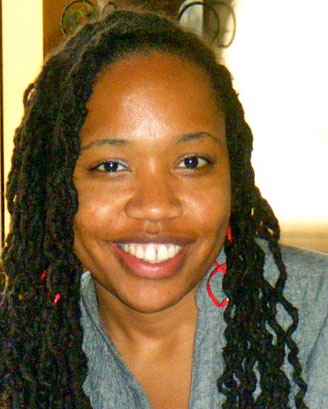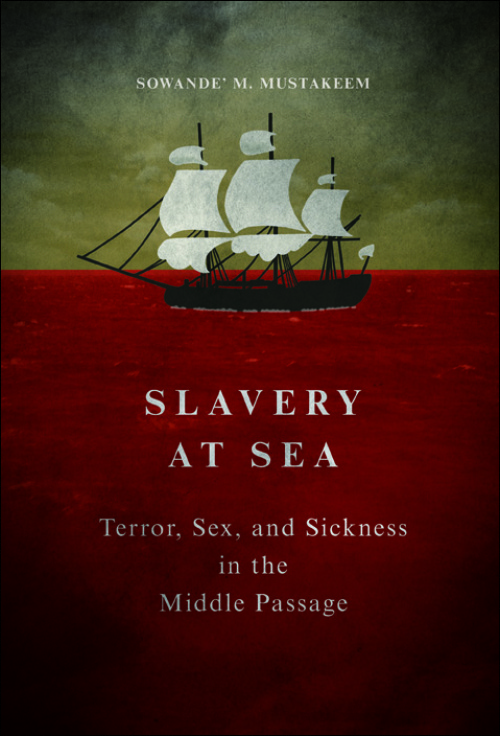Online Roundtable: Sowande’ Mustakeem’s Slavery at Sea
March 6–11, 2017
Black Perspectives is hosting an online roundtable on Sowande’ Mustakeem’s Slavery at Sea: Terror, Sex, and Sickness in the Middle Passage (University of Illinois Press, 2016). The roundtable begins on Monday, March 6, 2017 and concludes on Saturday, March 11, 2017. Moderated by blogger Jessica Marie Johnson (Johns Hopkins University), the roundtable will feature responses from Doug Egerton (LeMoyne College); Marisa Fuentes (Rutgers University, New Brunswick); Jessica Millward (University of California, Irvine); Vanessa Holden (Michigan State University); and Joshua D. Rothman (University of Alabama). On the final day, Sowande’ Mustakeem (Washington University in St. Louis) will offer concluding remarks.
During the week of the online roundtable, Black Perspectives will publish new blog posts every day at 5:30AM EST. Please follow Black Perspectives (@BlkPerspectives) and AAIHS (@AAIHS) on Twitter; like AAIHS on Facebook; or subscribe to our blog for updates. By subscribing to Black Perspectives, each new post will automatically be delivered to your inbox during the week of the roundtable.
About the Book
It is not easy to say new things about the slave trade, but Mustakeem does so, again and again. She strikes a mighty blow against the ‘violence of abstraction’ that has long governed the study of the subject. She makes us understand the slave trade in a new, visceral way.–Marcus Rediker, author of The Amistad Rebellion: An Atlantic Odyssey of Slavery and Freedom
Most times left solely within the confine of plantation narratives, slavery was far from a land-based phenomenon. This book reveals for the first time how it took critical shape at sea. Expanding the gaze even more deeply, the book centers how the oceanic transport of human cargoes–infamously known as the Middle Passage–comprised a violently regulated process foundational to the institution of bondage.
Sowande’ Mustakeem’s groundbreaking study goes inside the Atlantic slave trade to explore the social conditions and human costs embedded in the world of maritime slavery. Mining ship logs, records and personal documents, Mustakeem teases out the social histories produced between those on traveling ships: slaves, captains, sailors, and surgeons. As she shows, crewmen manufactured captives through enforced dependency, relentless cycles of physical, psychological terror, and pain that led to the the making–and unmaking–of enslaved Africans held and transported onboard slave ships. Mustakeem relates how this process, and related power struggles, played out not just for adult men, but also for women, children, teens, infants, nursing mothers, the elderly, diseased, ailing, and dying. Mustakeem offers provocative new insights into how gender, health, age, illness, and medical treatment intersected with trauma and violence transformed human beings into the world’s most commercially sought commodity for over four centuries.
About the Author
 Sowande’ Mustakeem is an assistant professor in the Department of History and the African and African American Studies Program at Washington University in St. Louis. She earned a bachelor’s degree from Elon University after completing an independent major in African-American studies. She received her master’s degree in African-American and African studies at The Ohio State University in 2002 and earned her doctorate in comparative black history from Michigan State University in 2008. She was the Andrew Mellon Post-Doctoral Fellow in History & Visiting Lecturer in African and African American Studies Program at Washington University in St. Louis from 2008-2010. Mustakeem has published a number of influential articles and book chapters on topics including black women’s history, gender, violence, the social history of medicine and the studies of the black Atlantic/African diaspora. Her articles have appeared in several leading journals including Atlantic Studies and the Journal of African American History. Slavery at Sea is her first book. Her new book project, Blood on the Concrete, explores the lives of women, black and white, who were convicted of violence and sometimes even forced to face execution for their crimes. Shifting the public gaze and historiographic trend of historically reading race, gender, incarceration and execution from the confine of the East Coast, this book will be the first of many kinds. It will alter the predominate centering of historical narratives interlinking prisons, crime and violence within urban familiars such as New York, New Jersey, and Philadelphia, and turn attention to a century of time within a far less traditional space of Jefferson City, Missouri within the Missouri State Penitentiary through the lives of women. Follow her on Twitter @somustakeem.
Sowande’ Mustakeem is an assistant professor in the Department of History and the African and African American Studies Program at Washington University in St. Louis. She earned a bachelor’s degree from Elon University after completing an independent major in African-American studies. She received her master’s degree in African-American and African studies at The Ohio State University in 2002 and earned her doctorate in comparative black history from Michigan State University in 2008. She was the Andrew Mellon Post-Doctoral Fellow in History & Visiting Lecturer in African and African American Studies Program at Washington University in St. Louis from 2008-2010. Mustakeem has published a number of influential articles and book chapters on topics including black women’s history, gender, violence, the social history of medicine and the studies of the black Atlantic/African diaspora. Her articles have appeared in several leading journals including Atlantic Studies and the Journal of African American History. Slavery at Sea is her first book. Her new book project, Blood on the Concrete, explores the lives of women, black and white, who were convicted of violence and sometimes even forced to face execution for their crimes. Shifting the public gaze and historiographic trend of historically reading race, gender, incarceration and execution from the confine of the East Coast, this book will be the first of many kinds. It will alter the predominate centering of historical narratives interlinking prisons, crime and violence within urban familiars such as New York, New Jersey, and Philadelphia, and turn attention to a century of time within a far less traditional space of Jefferson City, Missouri within the Missouri State Penitentiary through the lives of women. Follow her on Twitter @somustakeem.
About the Participants
 Jessica Marie Johnson is an Assistant Professor of History and Africana Studies at Johns Hopkins University. Johnson holds a Ph.D. and M.A. in History from the University of Maryland, College Park and a B.A. in African & African American Studies from Washington University in St. Louis where she was also a Mellon-Mays Undergraduate Fellow. Her research interests include women, gender, and sexuality in the African diaspora; histories of slavery and the slave trade; and digital history and new media and has appeared in Slavery & Abolition and Meridians: Feminism, Race and Transnationalism. As a digital humanist, Johnson is interested in ways digital and social media disseminate and create historical narratives, in particular, comparative histories of slavery and people of African descent. In 2008, she founded African Diaspora, Ph.D., a blog highlighting scholars and scholarship in the field of Atlantic African diaspora history. She is the recipient of several research fellowships and awards including the 2015-2016 Mellon Postdoctoral Scholar in the Program in African American History at the Library Company of Philadelphia. Johnson has two works in progress: a history of free women of African descent laboring, living, and traveling between eighteenth-century Senegal, Saint-Domingue, and Gulf Coast Louisiana; and (with Mark Anthony Neal) a compilation of work reading nineteenth-century black codes against present-day race coding and digital vernaculars of people of African descent. Follow her on Twitter @jmjafrx.
Jessica Marie Johnson is an Assistant Professor of History and Africana Studies at Johns Hopkins University. Johnson holds a Ph.D. and M.A. in History from the University of Maryland, College Park and a B.A. in African & African American Studies from Washington University in St. Louis where she was also a Mellon-Mays Undergraduate Fellow. Her research interests include women, gender, and sexuality in the African diaspora; histories of slavery and the slave trade; and digital history and new media and has appeared in Slavery & Abolition and Meridians: Feminism, Race and Transnationalism. As a digital humanist, Johnson is interested in ways digital and social media disseminate and create historical narratives, in particular, comparative histories of slavery and people of African descent. In 2008, she founded African Diaspora, Ph.D., a blog highlighting scholars and scholarship in the field of Atlantic African diaspora history. She is the recipient of several research fellowships and awards including the 2015-2016 Mellon Postdoctoral Scholar in the Program in African American History at the Library Company of Philadelphia. Johnson has two works in progress: a history of free women of African descent laboring, living, and traveling between eighteenth-century Senegal, Saint-Domingue, and Gulf Coast Louisiana; and (with Mark Anthony Neal) a compilation of work reading nineteenth-century black codes against present-day race coding and digital vernaculars of people of African descent. Follow her on Twitter @jmjafrx.
 Doug Egerton is Professor of History at LeMoyne College. He earned his PhD in History at Georgetown University. His work deals with the intersections between race and politics in early America. His books include Thunder At the Gates: The Black Civil War Regiments That Redeemed America (Basic Books, 2016), The Wars of Reconstruction: The Brief, Violent History of America’s Most Progressive Era (Bloomsbury, 2014), Year of Meteors: Stephen Douglas, Abraham Lincoln, and the Election That Brought on the Civil War (Bloomsbury, 2010), and Death or Liberty: African Americans and Revolutionary America (Oxford University Press, 2009). His first book, Charles Fenton Mercer and the Trial of National Conservatism (University Press of Mississippi1989), examined the career of the founder of the American Colonization Society, a group of conservative white antislavery politicians who wished to send freed slaves to Liberia. His other books, Gabriel’s Rebellion (UNC Press, 1993), He Shall Go Out Free: The Lives of Denmark Vesey (Rowman & Littlefield, 1999), and Rebels, Reformers and Revolutionaries (Routledge, 2002) explore slave rebelliousness.
Doug Egerton is Professor of History at LeMoyne College. He earned his PhD in History at Georgetown University. His work deals with the intersections between race and politics in early America. His books include Thunder At the Gates: The Black Civil War Regiments That Redeemed America (Basic Books, 2016), The Wars of Reconstruction: The Brief, Violent History of America’s Most Progressive Era (Bloomsbury, 2014), Year of Meteors: Stephen Douglas, Abraham Lincoln, and the Election That Brought on the Civil War (Bloomsbury, 2010), and Death or Liberty: African Americans and Revolutionary America (Oxford University Press, 2009). His first book, Charles Fenton Mercer and the Trial of National Conservatism (University Press of Mississippi1989), examined the career of the founder of the American Colonization Society, a group of conservative white antislavery politicians who wished to send freed slaves to Liberia. His other books, Gabriel’s Rebellion (UNC Press, 1993), He Shall Go Out Free: The Lives of Denmark Vesey (Rowman & Littlefield, 1999), and Rebels, Reformers and Revolutionaries (Routledge, 2002) explore slave rebelliousness.
 Marisa Fuentes is Associate Professor of Women’s & Gender Studies and History at Rutgers University, New Brunswick. She earned her PhD from the University of California, Berkeley. Her first book, Dispossessed Lives: Enslaved Women, Violence and the Archive (University of Pennsylvania Press, 2016) constructs historical accounts of urban Caribbean slavery in Bridgetown, Barbados from the positions and perspectives of enslaved women confined within traditional documents. Her broad research interests include Black Feminist Epistemologies, Subaltern and Slavery Studies, and analyses of sexuality, gender and “precarity” in the early Black Atlantic World. Fuentes’ work has been supported by the Ford Foundation, the Fulbright IIE, the Schomburg Center for Research in Black Culture with funding from the National Endowment of the Humanities, and fellowships from Harvard University and the University of North Carolina-Chapel Hill. Her article “Power and Historical Figuring: Rachael Pringle Polgreen’s Troubled Archive,” Gender & History Vol. 22: 3 (November 2010): 564–584 won the Andrés Ramos Mattei-Neville Hall Article Prize from the Association of Caribbean Historians in 2012 (for articles published between 2008-2011). Follow her on Twitter @Drmarisajf.
Marisa Fuentes is Associate Professor of Women’s & Gender Studies and History at Rutgers University, New Brunswick. She earned her PhD from the University of California, Berkeley. Her first book, Dispossessed Lives: Enslaved Women, Violence and the Archive (University of Pennsylvania Press, 2016) constructs historical accounts of urban Caribbean slavery in Bridgetown, Barbados from the positions and perspectives of enslaved women confined within traditional documents. Her broad research interests include Black Feminist Epistemologies, Subaltern and Slavery Studies, and analyses of sexuality, gender and “precarity” in the early Black Atlantic World. Fuentes’ work has been supported by the Ford Foundation, the Fulbright IIE, the Schomburg Center for Research in Black Culture with funding from the National Endowment of the Humanities, and fellowships from Harvard University and the University of North Carolina-Chapel Hill. Her article “Power and Historical Figuring: Rachael Pringle Polgreen’s Troubled Archive,” Gender & History Vol. 22: 3 (November 2010): 564–584 won the Andrés Ramos Mattei-Neville Hall Article Prize from the Association of Caribbean Historians in 2012 (for articles published between 2008-2011). Follow her on Twitter @Drmarisajf.
 Jessica Millward is Associate Professor of History at the University of California, Irvine. She earned her PhD in History at the University of California, Los Angeles. Her research interests center on comparative slavery and emancipation, African American history, the African Diaspora, gender and women, and law and society. She is the author of Finding Charity’s Folk: Enslaved and Free Black Women in Maryland (University of Georgia Press, 2015). Her research has been supported by the American Association of University Women; the Daughters of the Colonial Wars; the David Library of the American Revolution; the Maryland Historical Society; as well as the Organization of American Historians. Dr. Millward is a founding member of the UCI Ghana Project, is an educational and cultural exchange program between faculty, students, and staff at the University of California Irvine and the University of Ghana, Legon. Dr. Millward is a Research Associate at the Center for Comparative Immigration at UC San Diego as well as a member of the Organization of American Historian’s Committee on the Status of African American, Latino/a, Asian American, and Native American (ALANA) Historians and ALANA Histories. Follow her on Twitter @drjmil.
Jessica Millward is Associate Professor of History at the University of California, Irvine. She earned her PhD in History at the University of California, Los Angeles. Her research interests center on comparative slavery and emancipation, African American history, the African Diaspora, gender and women, and law and society. She is the author of Finding Charity’s Folk: Enslaved and Free Black Women in Maryland (University of Georgia Press, 2015). Her research has been supported by the American Association of University Women; the Daughters of the Colonial Wars; the David Library of the American Revolution; the Maryland Historical Society; as well as the Organization of American Historians. Dr. Millward is a founding member of the UCI Ghana Project, is an educational and cultural exchange program between faculty, students, and staff at the University of California Irvine and the University of Ghana, Legon. Dr. Millward is a Research Associate at the Center for Comparative Immigration at UC San Diego as well as a member of the Organization of American Historian’s Committee on the Status of African American, Latino/a, Asian American, and Native American (ALANA) Historians and ALANA Histories. Follow her on Twitter @drjmil.
 Vanessa Holden is an Assistant Professor of History at Michigan State University. She completed her PhD in African American and Women’s History at Rutgers University under the advisement of Deborah Gray White and Suzanne Lebsock in the spring of 2012. Dr. Holden is currently working on a book-length manuscript that argues that African American women, enslaved and free, were integral to the African American community’s culture of resistance. Her work focuses on the Southampton Rebellion of 1831 (Nat Turner’s Rebellion) and the participation and experiences of women before, during, and after America’s most famous slave rebellion. She is also the co-organizer of the Queering Slavery Working Group (#QSWG) with Jessica M. Johnson (MSU). Her research and teaching interests include African-American history, women’s and gender history, the history of the American South, and U.S. history (pre-1865). Follow her on Twitter @drvholden.
Vanessa Holden is an Assistant Professor of History at Michigan State University. She completed her PhD in African American and Women’s History at Rutgers University under the advisement of Deborah Gray White and Suzanne Lebsock in the spring of 2012. Dr. Holden is currently working on a book-length manuscript that argues that African American women, enslaved and free, were integral to the African American community’s culture of resistance. Her work focuses on the Southampton Rebellion of 1831 (Nat Turner’s Rebellion) and the participation and experiences of women before, during, and after America’s most famous slave rebellion. She is also the co-organizer of the Queering Slavery Working Group (#QSWG) with Jessica M. Johnson (MSU). Her research and teaching interests include African-American history, women’s and gender history, the history of the American South, and U.S. history (pre-1865). Follow her on Twitter @drvholden.
 Joshua D. Rothman is Professor of History at the University of Alabama. He earned his PhD from the University of Virginia. His research interests include nineteenth-century America, southern history, race and slavery, and social and cultural history. He is the author of many publications, including Flush Times & Fever Dreams: A Story of Capitalism and Slavery in the Age of Jackson (University of Georgia Press, 2012), Reforming America, 1815-1860: a Norton Documents Reader (W.W. Norton, 2010), Notorious in the Neighborhood: Sex and Families across the Color Line in Virginia, 1787-1861 (University of North Carolina Press, 2003). He is also Co-Director of Freedom on the Move: A Database of Fugitives from North American Slavery and recently received the Slavery, Resistance, and Abolition Fellowship of the Gilder Lehrman Center for the Study of Slavery, Resistance, and Abolition at Yale University. Follow him on Twitter @rothmanistan.
Joshua D. Rothman is Professor of History at the University of Alabama. He earned his PhD from the University of Virginia. His research interests include nineteenth-century America, southern history, race and slavery, and social and cultural history. He is the author of many publications, including Flush Times & Fever Dreams: A Story of Capitalism and Slavery in the Age of Jackson (University of Georgia Press, 2012), Reforming America, 1815-1860: a Norton Documents Reader (W.W. Norton, 2010), Notorious in the Neighborhood: Sex and Families across the Color Line in Virginia, 1787-1861 (University of North Carolina Press, 2003). He is also Co-Director of Freedom on the Move: A Database of Fugitives from North American Slavery and recently received the Slavery, Resistance, and Abolition Fellowship of the Gilder Lehrman Center for the Study of Slavery, Resistance, and Abolition at Yale University. Follow him on Twitter @rothmanistan.

